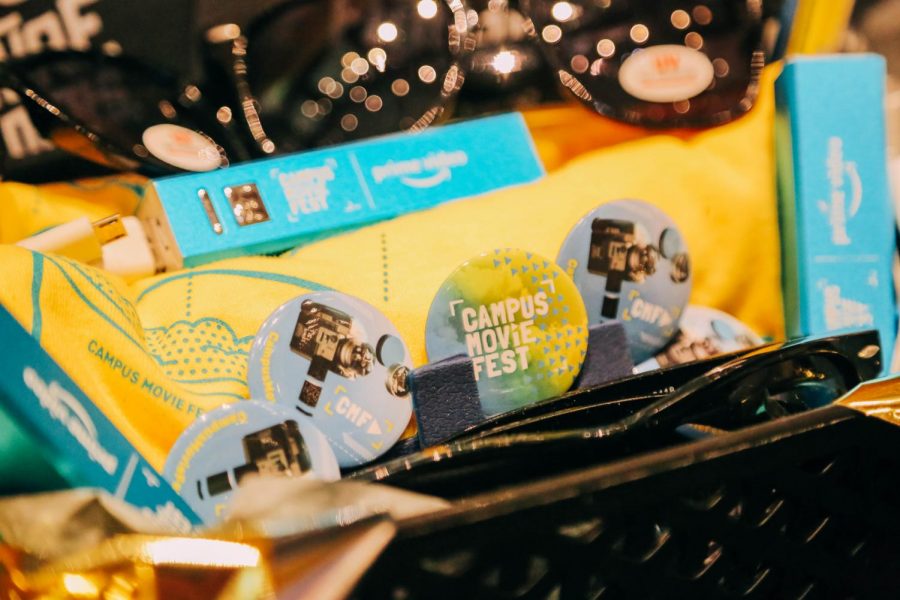Campus Movie Fest returned to San Diego State for the tenth installment of a week’s worth of storyboarding, filming, editing and premiering student-made short films.
The festival travels to various universities each year, providing students with equipment to make a short film in one week. The best of these films are screened at the premiere night at the end of the week-long period, and prizes are handed out.
“The reason that Campus Movie Fest exists is because we believe that everybody has a story that needs to be told and to give students the opportunity to tell their stories,” CMF Promotions Manager Meghan Moran said during the launch event a week prior to the premiere.
This year’s festival did not disappoint, with SDSU students submitting over 90 films. While the premiere only highlighted the top 16 short movies, all are available for viewing on the Campus Movie Festival website.
The air was festive and lively as students were left wondering which 16 movies would be selected for the premiere. Loud cheers erupted from the crowd as teams realized their film was about to be shown. Held within those films were a variety of themes, such as self-love and care, relationship issues, race relations, meta self-aware paradoxes, sexual violence and even a darkly comedic Christmas tale.
As always, door prizes and live-tweet sessions were a big part of the proceedings, along with the range of emotions displayed in the films.
“Last year’s films were really good, but I enjoyed this year’s selection much more,” film sophomore Cassidy Bryce said, as her and her fellow teammates discussed the diversity of the films showcased this year.
Their film wasn’t among the 16 screened, but they appeared to be in good spirits about it.
“SDSU is really unique in the fact that the top 16 here would all place in jury selection at any other campus,” event host and promotion specialist Raghav Ravi said after the premiere event.
The status of jury selection is granted to the best of the best films among the 16 screened at the premiere.
Films came from Campus Movie Fest veterans and first-timers alike. Film majors and novice movie-makers all showed up to see if their film had been selected to go up on the big screen. After all the films were shown, several filmmakers and actors walked away with awards for their work.
The four jury awards went to “Bye Luna,” a drama directed by Alexis Duran, “Sorry Doesn’t Cut It,” a romantic drama directed by Jerry La, “My Little Girl,” a drama directed by David Cortez, and “A Christmas Miracle,” a comedy by Kevin Waczec.
Alexis Duran almost didn’t turn in his emotional project tackling race relations, due to the high intensity of making the film within a week span while working on his graduate-level course work simultaneously. He said he was glad he got it done and winning has helped renew his spirit for the rest of the semester.
The five Silver Tripod Award winners were “My Little Girl,” “Memories,” directed by Clara Cojulun, “A Christmas Miracle,” “Sorry Doesn’t Cut It,” as well as “Memories,” directed by Clara Cojulun, and “Paradoxical,” directed by Isaiah Glasoe.
The award for Best Performance went to senior theater performance major Alyssa Ryan for her work in “Sorry Doesn’t Cut it.”
“We were filming from 7 p.m. to 2 a.m.,” Ryan said. “It’s worth it when you love it and you’re passionate about it.”
The team that brought the most audience members also won the grand prize of a trip to France, with an entry into the Cannes Film Festival for “A Christmas Miracle,” a dark comedy in which blood, violence and hilarity run rampant.
It’s worth noting this year’s event didn’t quite go off without a hitch, as there was some controversy regarding the originality of the night’s big winner. Several students were taken by surprise because they believed “A Christmas Miracle” was inspired by another film pitched in class by fellow film student Luke Lacasa.
“(Lacasa and Waczec) sit and share in class every single week,” said junior film major Eduardo Arozco, claiming Waczec was well aware of Lacasa’s pitch. “They share their ideas and the pre-production work they have done every week.”
Although the endings were different, some found the description of Lacasa’s idea, Christmas being disrupted by armed robbers, sounded similar to Waczec’s completed project. When the students protested and told officials of what they thought happened, no action was taken, since there wasn’t enough evidence to confirm any plagiarizing.
The high stakes of a trip to France for the Cannes Film Festival and a PlayStation 4 did seem to be a source of bitterness to the students who felt the idea wasn’t originally Waczec’s idea.
Waczec declined to comment on his team’s win or the claims other students made against it.







